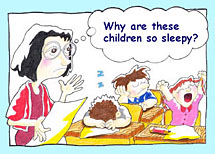Grammar: Sentence: Quoting and reporting speech and thoughts
| Reporting speech and thoughts |
Saying and thinking verbs in indirect speech
The main verbs used to report speech and thoughts, ie for indirect speech, are the same as those used for quoting speech and thoughts, ie say, ask, tell, and think. We outline here some of the significant differences between the verbs used for quoting and reporting.
Saying verbs for reporting Statements, Questions and Commands
The verbs say, ask and tell are each associated with the grammatical form or 'mood' that most commonly expresses the speech function of the reported clause, ie statement, question or command. The reported clause maintains the mood of the quoted clause in direct speech:
| Statement (declarative) | ||
|
Kitty said (that) her
brother was late. [indirect speech] Kitty said: "My brother is late." [direct speech] |
||
| Question (interrogative) | ||
|
Kitty asked (her
brother) if he was going to be late. [indirect
speech]
Kitty asked her brother: "Are you going to be late?" [direct speech] |
||
| Command (imperative) | ||
| Kitty told her brother to
be on time. [indirect speech] Kitty said to her brother: "Be on time!" [direct speech] |
||
A much greater variety of saying verbs are used for reporting speech or thoughts in writing than in conversation, eg announce, observe, point out, remark, report. In written English there are also a number of verbs used for reporting speech or thoughts that are generally not used for quoting speech or thoughts, eg claim, deny, imply, maintain, remind:
Some of the saying verbs used to report speech or thoughts are restricted to reporting Commands, eg encourage, forbid, persuade, recommend, undertake:
| Miss Lee persuaded Ricky to enrol in the photography club. [Command] |
In spoken indirect speech we generally make use of the more common verbs, eg say, ask tell (He said that he tired.) and use adverbs to indicate the manner in which the words were (allegedly) spoken (He quietly said that he was tired.). In story writing a greater variety of verbs are used used to indicate manner, eg cry, exclaim, grumble, murmur, shout, whisper, yell.
Thinking verbs for reporting Statements and Questions
The verb think is the most common verb used to report thoughts. However, it is mainly used for Statements, with a variety of other verbs used for Questions:
| Granny thought
(that) she knew how to catch the ghost. [Statement (declarative)] |
 |
| Miss Lee wondered why the children were so sleepy. [Question (interrogative)] |
 |
Thinking verbs for reporting Commands
The verbs used for reporting Commands express the wish that someone do something:
| Kitty liked Dotty
to ask her permission. Miss Lee wanted Ricky to join the photography club. Mrs Gong hoped that her children passed their test. |
The verbs used for reporting Commands express 'liking' and 'wanting', which belong to a subcategory of 'thinking and feeling' verbs. For more information on liking and wanting verbs, see:
Note that the terms Command, Question and Statement are written with an initial capital to remind us that they are functional terms.
|
Alternative terms |
|
| PrimeGram | Other grammars |
| quoting | direct speech |
| reporting | indirect speech |
Tell me more ... Structure of indirect speech |
|
||
To give us feedback about this section, click here or on the Comment button at the top of the screen.
If you have any questions about this section, visit the Language Corner.
If you have any questions or suggestions about how to teach this section, send a message to the Teaching Corner.